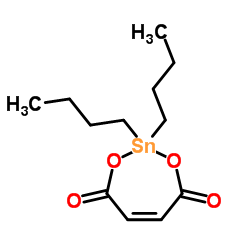78-04-6
| Name | Dibutyltin maleate |
|---|---|
| Synonyms |
EINECS 201-077-5
stannbm MFCD00014120 ks4b tn3j DBTM ots227 markbt31 Di-n-butyltin maleate ma300a tn1000 2,2-dibutyl-1,3,2-dioxastannepin-4,7-dione kk3206 Metatin 725 Di-n-butylzinnmaleinat dibutyltin maleinate ester bt31 2,2-Dibutyl-1,3,2-dioxastannepine-4,7-dione |
| Density | 1,318 g/cm3 |
|---|---|
| Boiling Point | 324.1±25.0 °C at 760 mmHg |
| Melting Point | 135-140 °C(lit.) |
| Molecular Formula | C12H20O4Sn |
| Molecular Weight | 346.995 |
| Flash Point | 149.8±23.2 °C |
| Exact Mass | 348.038361 |
| PSA | 80.26000 |
| LogP | 0.16980 |
| Vapour Pressure | 0.0±0.7 mmHg at 25°C |
| Index of Refraction | 1.502 |
CHEMICAL IDENTIFICATION
HEALTH HAZARD DATAACUTE TOXICITY DATA
|
| Symbol |




GHS05, GHS06, GHS08, GHS09 |
|---|---|
| Signal Word | Danger |
| Hazard Statements | H302-H314-H317-H330-H341-H360-H372-H411 |
| Precautionary Statements | P201-P260-P273-P280-P284-P305 + P351 + P338 |
| Personal Protective Equipment | Eyeshields;Faceshields;full-face particle respirator type N100 (US);Gloves;respirator cartridge type N100 (US);type P1 (EN143) respirator filter;type P3 (EN 143) respirator cartridges |
| Hazard Codes | T:Toxic; |
| Risk Phrases | R24/25;R26;R36/37/38 |
| Safety Phrases | S26-S28-S36/37-S45-S60-S61-S36/37/39-S22 |
| RIDADR | UN 3146 6.1/PG 2 |
| WGK Germany | 3 |
| RTECS | JH4735000 |
| Packaging Group | III |
| Hazard Class | 6.1(b) |
